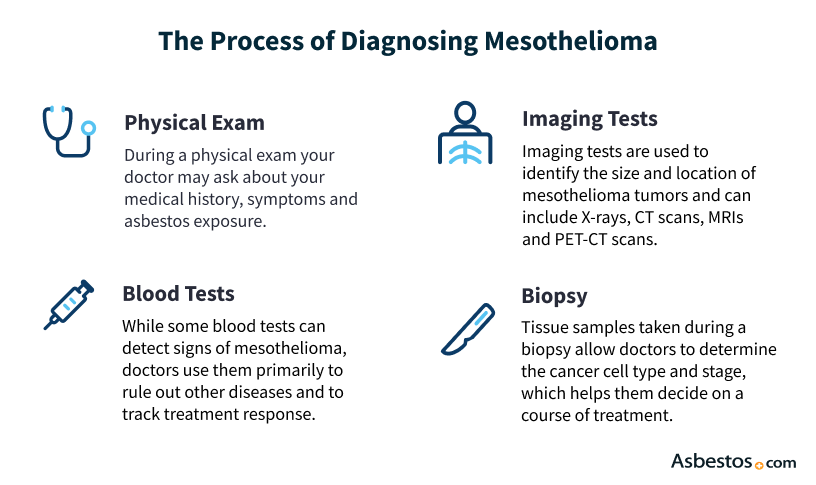Mesothelioma Diagnosis
Diagnosing mesothelioma can be challenging because signs of the disease are similar to other conditions. Imaging and blood tests, as well as physical exams, are helpful tests for mesothelioma, providing key information. A biopsy and pathology report can confirm your mesothelioma diagnosis.
How Is Mesothelioma Diagnosed?
Mesothelioma diagnosis may involve a combination of tests, including a physical exam, imaging tests, fluid analysis and biopsies to confirm this rare cancer. Mesothelioma tests depend on your symptoms and where your tumor is located.
Diagnosing mesothelioma can be challenging because signs of the disease are similar to other conditions. If you and your doctor have discussed your history of asbestos exposure and symptoms, they may suspect mesothelioma.
Access top mesothelioma doctors, and get help scheduling appointments.
Find a Top DoctorKey Tests to Diagnose Mesothelioma
- Medical history and physical exam: Discuss your complete history with your doctor who will perform a physical exam to identify signs of mesothelioma .
- Blood tests: They can show unusual blood cell counts and some markers for mesothelioma but can’t detect mesothelioma cancer cells.
- Imaging tests: Seeing tumor size, location and spread on PET scans, X-rays, CT scans and MRIs can help identify the stage of cancer progression.
- Fluid analysis: Fluid is removed in procedures like thoracentesis and paracentesis. Analysis of cells in this fluid can help diagnose mesothelioma.
- Biopsies: Common procedures for collecting tissue or tumor samples include needle biopsy, thoracoscopy with VATS, laparoscopy and mediastinoscopy.
Your doctor may refer you to an oncologist for further tests for mesothelioma. Your oncologist will listen for sounds indicating fluid buildup, a common sign of mesothelioma. Then, you’ll likely have imaging tests to identify where tumors are located and how far they’ve spread, a process known as staging the disease.
A biopsy is the most important test in confirming a mesothelioma diagnosis. A pathologist will use a microscope to study the tissue or tumor sample collected during your biopsy and write up their findings. Pathology reports show the specific type of mesothelioma cells in your sample. The type of mesothelioma cell can affect your prognosis and treatment plan.

Medical History and Physical Exam
If you have chest pain, trouble swallowing, shortness of breath or back pain, and you were exposed to asbestos, see your doctor. First, your doctor will discuss your medical history and ask about asbestos exposure.
Then, your doctor will do a physical exam, checking for symptoms of mesothelioma, such as fluid buildup in the chest (pleural effusion) or in the abdomen (ascites). They’ll check for fluid around the heart (pericardial effusion). In rare cases of testicular mesothelioma, they perform a physical examination of the groin area.

Understand your diagnosis, top doctors and ways to afford care.
Get Your Free GuideImaging Tests for Mesothelioma
Radiologists use mesothelioma imaging tests, including PET scans, X-rays, echocardiograms, CT scans and MRIs, to locate and assess mesothelioma tumors. Some scans involve contrast dye. Most scans are generally quick and painless. MRIs can take 30 to 90 minutes.
Types of Mesothelioma Imaging Scans
- Computed tomography (CT) scans: CT scans produce high-resolution cross-sections with detailed views of possible tumors in the chest and abdomen.
- Positron emission tomography (PET) scans: PET scans use an injected radioactive tracer to find cancer cells. PET/CT scans combine both as a more comprehensive tool.
- Magnetic resonance imaging (MRI) scans: MRIs use a strong magnetic field and radio waves to form detailed images of the person’s soft tissues.
- X-rays: These are most likely the first imaging test done. X-rays can identify pleural or peritoneal tumors. X-rays only provide a 2D view.
- Echocardiograms: A noninvasive procedure, echocardiograms use ultrasound to create an outline of the movement of the heart.
Doctors use imaging scans to see signs of asbestos exposure. They look for hardened areas on the lung lining called pleural plaques. These signs and other tests help doctors see if an asbestos-related disease is present.
Some scans such as MRIs may cause anxiety in some patients. Health care providers may prescribe anti-anxiety medications. These drugs help patients relax during the scan.
“The day I found out I was diagnosed with mesothelioma, I was pretty scared. I was shocked. I was in shock. I felt like I was in the Twilight Zone. When they told me I was diagnosed with mesothelioma, no one knew what it was. I didn’t know what it was. My mom, my husband, no one. It was the day my whole life changed.”
Blood Tests
Blood tests looking for certain proteins or other biomarkers can help indicate mesothelioma. Some mesothelioma biomarkers can also show up in people who don’t have this cancer. This is why doctors need other tests like biopsies and scans to confirm mesothelioma. Examples of blood tests used to diagnose mesothelioma include MESOMARK, N-ERC/mesothelin and fibulin-3 blood tests.
Mesothelioma cells make fibulin-3, but it’s also found in other cancers like cervical cancer. This makes fibulin-3 blood tests helpful indicators of mesothelioma but not definitive. Similarly, the Mesomark blood test looks for molecules called soluble mesothelin-related peptides. Mesothelioma cells make SMRPs. But SMRPs have also been found in ovarian and pancreatic cancer.
New types of tests are also being studied. In 2025, the American Society of Clinical Oncology started to recommend genetic testing. Genetic testing often involves blood and saliva tests. A 2024 review reports up to 10% of patients diagnosed with mesothelioma have what’s known as a BAP1 mutation. They tend to respond better to chemotherapy. Patients with this mutation have a median survival of 5 years.
Fluid Analysis (Cytology Tests)
Mesothelioma cytology tests help doctors find cancer cells in fluid. Doctors collect samples from effusions or ascites from the chest, abdomen or heart area. Then, they use a microscope to search for cancer cells. If they find cancer cells, it helps them diagnose mesothelioma.
Types of Mesothelioma Cytology Tests
- Paracentesis: Doctors insert a needle into your belly to remove fluids for testing. This test is common for people with peritoneal mesothelioma.
- Pericardiocentesis: A needle is inserted into your chest to remove fluid from around your heart. This test is common for those with pericardial mesothelioma.
- Thoracentesis: Doctors insert a needle into your chest. This procedure is common for people with pleural mesothelioma.
Both cytology tests and biopsies help diagnose mesothelioma, according to a 2024 study published in the Journal of the American Society of Cytopathology. The key difference between the two tests is cytology tests look at fluid, while biopsies take tissue samples. Biopsies give more information about cancer cells, which is how doctors determine whether you have cancer.
Biopsies
A biopsy is the best test used to diagnose mesothelioma. This medical procedure takes a sample of tissue that’s studied under a microscope to check for cancer cells. Doctors suggest a biopsy if you show signs of mesothelioma. Imaging scans, such as CT or PET scans, help guide where the sample should be taken from and assess cancer spread.
Types of Mesothelioma Biopsies
- Laparoscopy: Doctors make a small cut in the abdomen and use a tiny camera and tools to take a tissue sample. This type of endoscopic biopsy is best for peritoneal mesothelioma.
- Mediastinoscopy: A small cut is made above your breastbone, then doctors use a tube with a light to see and take tissue. This is for biopsies of the lymph nodes and around the windpipe for pleural mesothelioma.
- Needle biopsy: A thin needle is put through your skin to take a small piece of tissue. Also known as a fine-needle aspiration, it’s used for tissue samples that are hard to collect.
- Surgical biopsy: A larger cut is made to remove a tissue sample when other methods don’t work. This is used when an endoscopic or fine-needle biopsy isn’t possible.
- Thoracoscopy: Doctors make a small cut in the chest, then use a tube with a camera to look and take tissue. This is the most accurate biopsy for diagnosing pleural mesothelioma.
Mesothelioma specialist Dr. David Sugarbaker told us a biopsy is essential to diagnose mesothelioma. He explained, “The lining of the lung becomes thickened, which begins to show on a CT scan or X-ray. Even though the cytology report is negative, there can be cancer there. Therefore, a biopsy is the most definitive way in which patients will understand clearly that they either have or don’t have mesothelioma.”
Staging Mesothelioma Cancer
Mesothelioma staging is part of the diagnostic process. It describes how far tumors have spread, which can be seen on imaging scans. The 4 stages of mesothelioma range from early stage (stages 1 and 2) to late stage (stages 3 and 4). The higher the number, the more the cancer has spread from where it started.
Staging helps doctors plan the best treatment. An early-stage diagnosis improves treatment options. A late diagnosis makes these treatments less effective. Later stages become more difficult to treat.
The TNM staging system is the official system doctors use to stage pleural mesothelioma. It identifies tumor size and location, and whether cancer cells have entered lymph nodes or metastasized. Doctors use a modified TNM system for peritoneal mesothelioma. There is no official staging system for pericardial or testicular types.
“When staging mesothelioma, I assess where the cancer is located, how far it has spread, and which organs are involved. This information is essential in developing the most effective treatment plan for each of my patients.”
Why Is Diagnosing Mesothelioma Difficult?
Diagnosing mesothelioma is difficult because its symptoms mimic more common illnesses like bronchitis or pneumonia. Mesothelioma survivor Wendy M. Phillips tells us, “I went to the hospital with a swollen arm and was initially told I had a blood clot. Mesothelioma tumors were blocking my lymph nodes.”
Getting a second opinion from an expert is important. Many oncologists haven’t seen patients with mesothelioma before. They may misdiagnose mesothelioma or not consider it as a possible diagnosis. “Many patients we speak with have told us they were diagnosed after going to the hospital for what they thought was an unrelated symptom,” say the Patient Advocates at The Mesothelioma Center. The latency period between asbestos exposure and mesothelioma can be 20 to 60 years. Symptoms may not show up for decades.
Importance of Early Mesothelioma Detection
Detecting mesothelioma early is vital. It lets doctors begin treatment sooner. This can lead to treatment success and better life expectancy. According to the Centers for Disease Control and Prevention, early mesothelioma detection isn’t common. Between 2017 and 2021, a total of 70.9% of mesothelioma diagnoses occurred after stage 1.
“After my surgery, I was told my mesothelioma was stage 1-B,” survivor Kevin Hession tells us. Doctors diagnosed him with pleural mesothelioma in 2021. This came after 4 bouts of pleurisy (inflammation of the pleura). Ongoing chemo keeps his disease under control.
The experience of mesothelioma specialists is invaluable. General health care providers might not have the skills for complete care. Early detection from a mesothelioma specialist can help people live longer.
A specialist helped peritoneal survivor Tamron Little. “At first, I was under the care of an oncologist who said he knew nothing about mesothelioma. But I finally found the right mesothelioma specialist. I was presented with a roadblock and decided to go around it.”

Filled with thoughtful items to bring comfort and encouragement while undergoing treatment.
Get Your Free KitWhat to Do After a Mesothelioma Diagnosis
A mesothelioma diagnosis can be overwhelming, but Patient Advocates can help patients navigate treatment, legal options and support resources. Seeing a mesothelioma specialist is crucial.
Next Steps After a Mesothelioma Diagnosis
- Meet with a mesothelioma specialist
- Inquire about eligibility for surgery, chemotherapy and immunotherapy
- Consider second opinions and clinical trials
- Get support from patient advocacy groups
- Explore legal options for legal compensation
Many doctors lack experience in diagnosing and treating mesothelioma. Sometimes, they get the stage or cell type wrong. A second opinion from an expert is useful if you get a diagnosis from a nonspecialist. They can confirm the diagnosis. You’ll also have access to new therapies and clinical trials.
“Most people who contact us about diagnosing mesothelioma are looking for a second opinion,” says Patient Advocate Dr. Snehal Smart. “We can connect them with treatment specialists and arrange appointments and treatment if they do receive a confirmed mesothelioma diagnosis.”
- New tech aims to help diagnose mesothelioma. Researchers recently made an AI tool that successfully determined mesothelioma cell types, but diagnosis is still a big challenge, according to the journal Nature.
- Patients with a history of asbestos exposure or symptoms such as persistent cough, chest pain or shortness of breath should seek medical evaluation immediately.
“Making an accurate mesothelioma diagnosis can be tough. The initial signs on imaging can be nonspecific. Misdiagnosis can occur. It’s important to tell mesothelioma apart from other cancers that can spread to the pleura. The treatments are very different based on an accurate diagnosis.”
Common Questions About Diagnosing Mesothelioma
- Who should be tested for mesothelioma?
-
Long-term asbestos exposure creates the greatest risk of a mesothelioma diagnosis. If you have a history of asbestos exposure, talk to your doctor and watch for symptoms. A cough, shortness of breath and chest pain tend to develop first. See your primary doctor if you develop new symptoms. Families of asbestos workers face secondary exposure. This can also cause mesothelioma.
- How long does it take to get a mesothelioma diagnosis?
-
About 3 months is the average time it takes to get a mesothelioma diagnosis. This is after the first symptoms appear. The most common symptoms include shortness of breath and chest pain.
- How do you prepare for a mesothelioma biopsy?
-
The first step in preparing for a mesothelioma biopsy is to stop all blood-thinning meds at least 5 days before your biopsy. Don’t eat or drink anything 6 hours before your appointment. Wear loose clothes to the appointment. Also, arrange for a designated driver to take you home. Plan to spend several hours undergoing the biopsy. Some biopsies need at least one night in the hospital.







